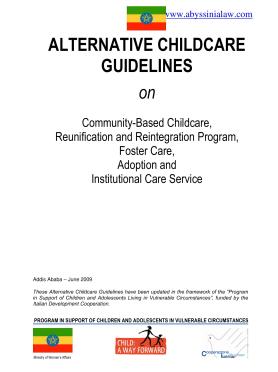ALTERNATIVE CHILDCARE GUIDELINES
ALTERNATIVE CHILDCARE GUIDELINES
The population in Ethiopia is generally characterized by a very young structure, with children below age 18 years accounting to 52% of the national population. Children below age 15 represent 44% of the national population. The number of children living in difficult circumstances is noted to be significant due to social, economic, political as well as cultural factors (MOLSA, 2005). It is currently estimated that there are about 4.6 million orphans, out of which 1 million have lost their parents due to AIDS (UNICEF, 2004). Many studies indicated that there are at least 100,000 street children in Ethiopia (about 25% are girls). UNICEF‟s projected estimate puts the figure to 185,000 in 2003 (UNICEF, 2001). Children with disabilities account for 51%, out of the estimated 4.9 million persons with some impairment in the country (NPA, 2004). It is to be noted that there is also a large number of Ethiopian children who are in conflict with the law, children working in hazardous conditions, displaced and refugee children.
Ethiopia has ratified the United Nations Convention on the Rights of the Child (UNCRC) and designed favorable policies and national plans to address the plights of children. However, the emphasis directed to mitigate the problems of children living under difficult circumstances still requires much more effort from all concerned actors. In this regard, various governmental and non-governmental organizations are making efforts to support children in general and children under difficult circumstances in particular through different modes of care and services.
Despite the fact that the practice of rendering childcare services for unaccompanied children has a long history in the country, it was not until 2001 that standardized regulatory mechanisms (Alternative Childcare Guidelines) were developed. This was made possible by a joint undertaking of the Ministry of Labor and Social Affairs (MoLSA) and the Italian Development Cooperation (IDC), as part of the interventions to alleviate the problems of children under difficult circumstances in the country. Accordingly, the national Guidelines consisting of services on institutional care, community-based child support programs, adoption, foster-care and child-family reunification were developed in 2001.

